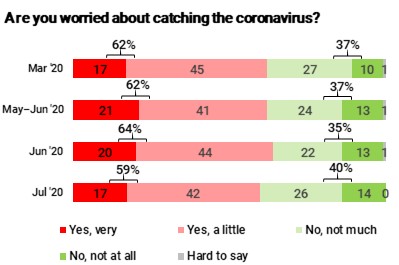25/2020
2020-08-05
Fear of infection in July
In July a smaller percentage of people than in previous months was worried about catching the SARS-CoV-2 coronavirus. Anxiety over becoming infected was expressed by 59% of respondents (5 percentage points lower than June), while 40% were not concerned (5 points more than previously).

|
The biggest differences in anxiety over the coronavirus were connected with age: in the 18-24 age group 31% of respondents expressed concern, while among the over 65s this was as high as 76%.
Fear of infection was more often a worry for women (65%) than men (53%).
The higher the level of education, the lower the fear of the coronavirus. Of people with a primary or secondary school education 69% expressed anxiety, while for university graduates this was 54%.
When looking at the size of the places where people live, inhabitants of villages and small towns (with populations below 20,000) were the most anxious: 63% of respondents in both groups said they were worried. Least anxious about possible infection were respondents from towns with populations of 100,000-499,999, just over half of whom (51%) expressed concern. The inhabitants of the largest cities, with populations over 500,000, admitted to being worried somewhat more frequently (57%).
When it comes to differences based on employment, the greatest concern was among retired pensioners (76%) and those on long-term health and invalidity benefits (71%). Farmers (68%) and office workers (66%) also expressed anxiety relatively frequently. Least worried were school and university students (38%), workers in the service sector (41%) and skilled manual workers (42%).
Fear of infection was somewhat less frequent among those with relatively high incomes than those with low or average earnings. In the groups of respondents declaring a household income below 2000 zloty per capita, 63% expressed anxiety. This became 59% for those with a per capita income of 2000-2999 zloty, dropping to 55% for those with over 3000 zloty disposable income.
This ‘Current Events and Problems’ survey (361) was conducted using a mixed-mode procedure on a representative sample of named adult residents of Poland, randomly selected from the National Identity Number (PESEL) register.
Respondents independently selected one of the following methods:
– Computer Assisted Personal Interview (CAPI);
– Computer Assisted Telephone Interview (CATI), respondents receiving researchers’ telephone numbers in an introductory letter from CBOS;
– Computer Assisted Web Interview (CAWI), where respondents filled in the online questionnaire independently, gaining access by means of a login and password provided in an introductory letter from CBOS.
– Computer Assisted Personal Interview (CAPI);
– Computer Assisted Telephone Interview (CATI), respondents receiving researchers’ telephone numbers in an introductory letter from CBOS;
– Computer Assisted Web Interview (CAWI), where respondents filled in the online questionnaire independently, gaining access by means of a login and password provided in an introductory letter from CBOS.
In all three cases the questionnaire had the same structure and comprised the same questions. The survey was carried out between 30 June and 9 July 2020 inclusive on a sample of 1339 people (66.1% using the CAPI method, 19.6% CATI and 14.3% CAWI).





